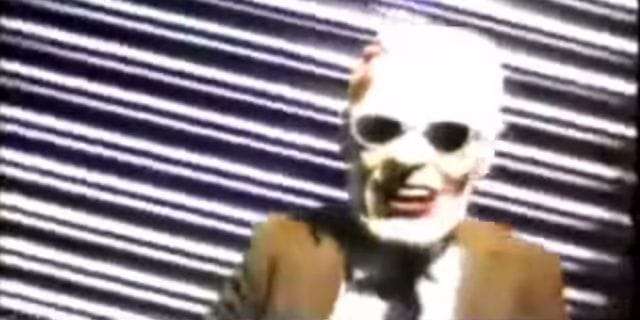Episodes: The scariest piece of television ever made

(We're talking about scary stuff this week, all right?)
In late November 1987, the city of Chicago was briefly seized by a crime that became terrifying precisely because it was so pointless. A man in a Max Headroom mask hijacked the signal of first WGN (famous for Cubs games!) and then the local PBS affiliate WTTW to bob nonsensically in front of the camera and rant about things, before mooning viewers. You can watch his broadcast here.
He has never been caught.
Now, obviously, that he hasn't been caught is not on the level of, say, the Zodiac Killer eluding capture. The Max Headroom pirate wasn't a truly dangerous criminal. He was just a goofy prankster who wanted to show how easily the walls of television could come tumbling down. For a few brief moments, he tore apart the fabric of what viewers were watching and replaced it with one of his own devising.
I consider this the scariest television broadcast of all time.
If you watch this, you won't come away from it fearing for your life or feeling your palms break out in sweat or anything like that. But I find it incredibly difficult to imagine someone watching this and not feeling a distinct sense of unease at all of it. Television is predicated, on some level, on predictability. Even if you don't know who's going to die next on Game of Thrones, you know when and where you'll be able to find it. This is something else entirely.
Technically, I suppose, this is culture-jamming, the idea of taking the normally safe, staid pop culture we're fed and manipulating it to present some other message, even if that's as simple as saying HBO is too expensive. Max didn't have any such message, other than to say that WGN's Chuck Swirsky was a "freakin' liberal," which is at once incredibly specific and incredibly generalized commentary.
No, Max just seemed to be reveling in the idea of getting away with this, and his time on screen mostly consists of pointless, disconnected fragments of ideas. He bops around, the plastic grin of his mask hiding his true expression. He drinks Pepsi while saying Coke's slogan. He sings. Somebody spanks his half-naked ass.
Written out like that, it all sounds vaguely amusing or annoying. But in practice, there's something horrible about it, something close and too intrusive. A lot of that has to do with how Max is framed by the camera, so that he never quite takes over the frame the way we might want him to. (He's almost an early precursor to Mr. Robot.) Behind Max, some sort of metal grating sways back and forth, making it feels as if we are tilting, like we're far out at sea, cast adrift on the waves. This isn't meant to amuse us or provoke new thoughts. It's meant to unmoor us. There's no message here. Just a plunge into an abyss with a bottom that never arrives.
If you can, find video of the WTTW broadcast that includes the brief footage of the Doctor Who episode airing both before and after the intrusion, which is even more unnerving. The reason for this is simple: Any time a television broadcast is interrupted, we've been conditioned to think something bad is happening. (My mind always goes to the horrific noise of tornado warnings from my youth.) To have one suddenly segue into something else is another level of that entirely.
The best theories I've seen for this suggest that it involved people in the Chicago broadcasting community, who would know what was needed to hijack the signal, who didn't have a larger point to make and, instead, simply wanted to goof around with the possibilities of breaking into a live broadcast.
But regardless of the motives of the hijacker (which were almost certainly just to goof off on TV), there's still the fact that analog technology has this air of spookiness to it. I remember many times, staring at static-filled channels as a child, waiting for something to emerge out of them, something to make sense. And blinking TV towers in the night have always struck me as a bit otherworldly, beacons transmitting silent, invisible waves that carry on them picture and sound.
Or think, for instance, of landline telephones, and how much more potent stories of ghosts calling from beyond the grave are when there's that tinny ring, the sound of an operator on the other end, then the dull, faint hiss of the afterlife. It's harder to get that with a cell phone.
There's been much written about the transition from analog to digital, what's been gained and lost in that process. But, for me, there will always be something spookier about the world of my childhood, the world of an analog technology that brought the world to your door, but only in regimented increments.
TV prides itself on finding a way to make itself feel like a part of your family, a part of your home. It invites you in. It asks you to sit a spell, at a certain time, for a certain period, every week. It holds everything at bay and lets you forget your troubles, or ruminate on them in a safe space. It's an escapist medium at heart, one that locks the door to keep the truly bad things out, then throws away the key. You're safe, in other words. Until somebody finds a way to break down the door and let themselves in.
--
Episodes is published daily, Monday through Friday, unless I don't feel like it. It is mostly about television, except when it's not. Suggest topics for future installments via email or on Twitter. Read more of my work at Vox Dot Com.




